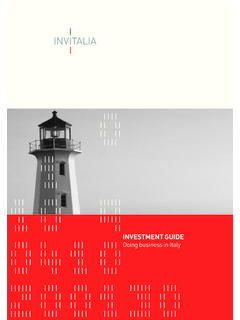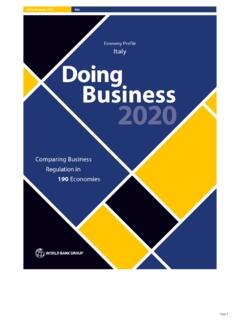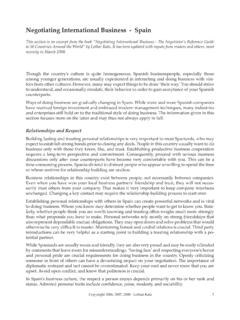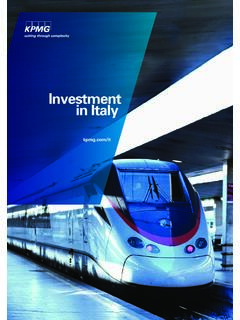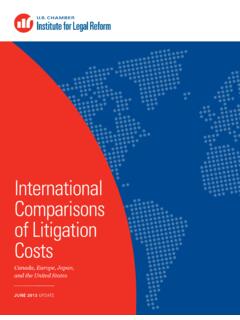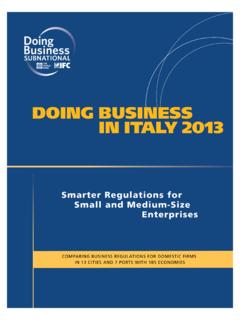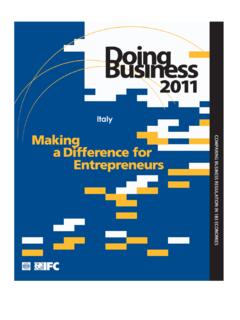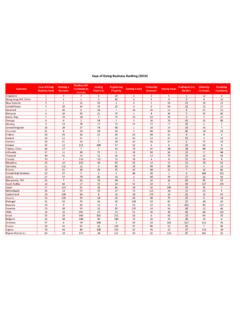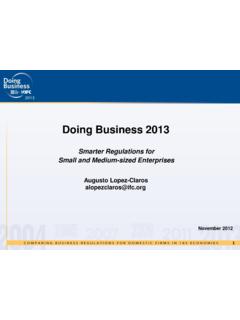Transcription of UHY Doing Business Guide
1 Doing Business IN italy CONTENTS 1 Introduction 3 2 Business environment 4 3 Foreign Investment 7 4 Setting up a Business 10 5 Labour 17 6 Taxation 21 7 Accounting & reporting 26 8 UHY Representation in italy 29 Doing Business IN italy 3 1 INTRODUCTION UHY is an international organisation providing accountancy, Business management and consultancy services through financial Business centres in around 90 countries throughout the world. Business partners work together through the network to conduct transnational operations for clients as well as offering specialist knowledge and experience within their own national borders. Global specialists in various industry and market sectors are also available for consultation. This detailed report providing key issues and information for investors considering Business operations in italy has been provided by the office of UHY representatives: UHY italy Via Birmania, 81 I-00144 Rome, italy Phone +39 06 5917469 Website Email You are welcome to contact Dr Paolo Lenzi for any inquiries you may have.
2 A detailed firm profile for UHY s representation in italy can be found in section 8. Information in the following pages has been updated so that they are effective at the date shown, but inevitably they are both general and subject to change and should be used for guidance only. For specific matters, investors are strongly advised to obtain further information and take professional advice before making any decisions. This publication is current at December 2017. We look forward to helping you do Business in italy . Doing Business IN italy 4 2 Business ENVIRONMENT THE ITALIAN CONSTITUTION AND GOVERNMENT italy is a republic divided into regions, provinces and municipalities. The parliament is the legislative body of the Republic and consists of a Senate and Chamber of Deputies. Its members are elected by popular vote to five-year terms of office. The president of the Republic is elected for a seven-year period by parliament and must be an Italian citizen of at least 50 years of age.
3 The president has many political duties, but minimal political power. The government of ministers holds executive power and parliament may delegate legislative power to it for specific matters within defined limits. In emergencies, the government of ministers may issue temporary decrees, which are subject to parliamentary ratification or veto. The regional governments have legislative power in certain areas, such as health and hospital services, local taxes, urban planning and transportation. THE DOMESTIC MARKET POPULATION italy has approximately 60 million inhabitants, with an average population density of 199 people per square kilometre (516 per square mile). The population is predominantly Roman Catholic. AREA The country covers an area of 301,266 square kilometres (approximately 116,300 square miles). Rome is the capital city. Other large cities include Milan, Naples, Turin and Genoa.
4 The Milan, Turin and Veneto regions are the main industrial centres of the country. THE ECONOMY italy s economy is based primarily on the transformation of raw materials (usually imported) into finished products to satisfy domestic and foreign demand. Investment opportunities are encouraged and the government, regions and provinces offer investment incentives, many of which encourage industrialisation in the southern part of the country. italy s economic development varies greatly from region to region. The north is highly industrialised with good infrastructure and a highly trained workforce. The south ranks low in these characteristic indicators and significant incentives are offered to investors to develop in the area. The Italian economy consists of three major sectors: large private companies, the public sector and the small Business sector. Doing Business IN italy 5 ESSENTIAL INDUSTRIES italy ranks among the seven most industrialised countries in the world.
5 Italian industry consists of a few large companies and many small and medium-sized enterprises specialised in a variety of activities. Industry is presently declining due to high labour costs compared to those of less industrialised countries, while service activities are expanding. Service activities represent about 74 % of gross domestic product (GDP) and include commerce, transportation, communications, property rental, banking and insurance. The manufacturing industry represents about 24 % of GDP and includes construction, textiles and apparel, machinery, chemicals, pharmaceuticals, non-metal minerals and transportation vehicles. The agricultural industry represents about 2 % of GDP; its principal products are wheat, rice and other cereals, vegetables, fruits, wine, olive oil and dairy produce. EMPLOYMENT ENVIRONMENT The Italian labour market is characterised by a shortage of skills in some sectors and notable unemployment in others.
6 The official unemployment rate at August 2017 was of the active population. The level of employment varies significantly between regions, although official statistics do not reflect the situation accurately due to the high level of unofficial employment. Employees are classified by law into four categories: Workers (operai) Low-ranking white collar workers (impiegati) High-ranking white collar workers (quadri) Executives (dirigenti). The law specifically protects lower-ranking employees. PRICES AND INTEREST RATES italy s efforts to meet the Maastricht convergence criteria for the European Monetary Union (EMU) have resulted in a stabilisation of prices and a decrease in interest rates to historical lows. The average inflation rate as at 31 December 2017 was %. FOREIGN TRADE AND THE BALANCE OF PAYMENTS italy is a member state of the EU and also adheres to the EMU. The country is a significant net importer of energy, chemicals and ferrous and non-ferrous metals, and is a significant net exporter of manufactured goods and textiles (in particular, furniture and equipment).
7 italy s foreign trade in merchandise shows a low surplus, while services and transfers produce consistent surpluses. Doing Business IN italy 6 FINANCIAL SYSTEM The central bank, the Bank of italy , stabilises money supply and supervises banking and credit institutions. Historically, the Bank of italy s primary concern was to ensure the stability of the credit system. It currently encourages the merger of the smallest banking institutions with larger institutions and promotes the technological evolution of banks, assisting them in the modernisation of the payment system. The banking system, supervised by the Bank of italy , consists primarily of: Ordinary banks, which include private companies and the subsidiaries and branches of foreign banks, and Co-operative people s banks (banche popolari), which are generally active within provinces or regions. A Bank Deposit Insurance Fund (Fondo Interbancario di Garanzia dei Depositi) was created in 1987 to cover deposits in measures appropriate to different balances.
8 Banks which participate in the fund hold 99% of italy s customer deposits. They must meet standards of capital adequacy, asset quality and bad debt ratios set by the fund. Banks are competing by engaging in new activities and acquiring interests in other financial activities, such as merchant banking, leasing, factoring, management of investment portfolios, payment services and information technology. Doing Business IN italy 7 3 FOREIGN INVESTMENT italy encourages foreign investment by offering foreign-owned entities the same incentives, primarily subsidised loans, cash grants and tax credits, available to entities owned by Italian nationals. Financial assistance and advice is available from banks, special credit institutions, state agencies and specialised consultants. Foreign investors may obtain other incentives from local (regional and provincial) authorities and the EU.
9 EXCHANGE CONTROLS Foreign exchange restrictions and controls were abolished in May 1990 following the implementation of legislation intended to align Italian regulations with the EU directive on the free movement of capital. For statistical purposes, banks file details of foreign exchange transactions for inbound and outbound movements of funds with the Financial Information Centre (Unit di Informazione Finanziaria) controlled by the Bank of italy . Individuals and legal entities are classified as residents or non-residents for exchange control purposes. The following are regarded as residents: Italian citizens having their habitual abode in italy , as well as corporate bodies, associations and organisations having their centre of activity in italy Italian citizens having their habitual abode abroad if they are employed in italy or carrying out Business or professional activities in italy more than occasionally Foreign citizens having their habitual abode in italy if they are employed in italy or carrying out Business or professional activities in italy more than occasionally Corporate entities, associations and organisations having their centre of activity abroad if they have a permanent establishment in italy through which they carry out activities in italy .
10 Entities which maintain current accounts or deposits with banks must notify them of changes in their residence classification. Non-residents may enter freely into the following transactions: Transfer payments for exports, credit instruments, securities and other assets denominated in euros or in foreign currencies Maintain with banks transferable accounts and deposits in euros and foreign currencies (these accounts and deposits are known as conti esteri) Sell certain financial products and services in italy . INVESTMENT INCENTIVES The numerous and varied incentives are generally directed to enhance the economic development of the country and, in particular, to accelerate the industrialisation of southern italy , including Sicily and Sardinia (Mezzogiorno), and certain localities in central and northern italy which are recognised as depressed areas. Doing Business IN italy 8 Incentives are also available to encourage technological innovation and to assist in the development of exports.










